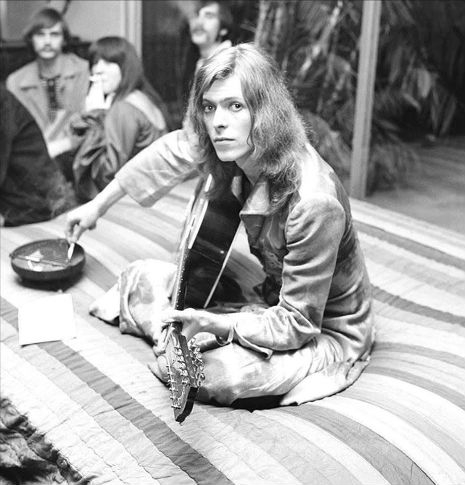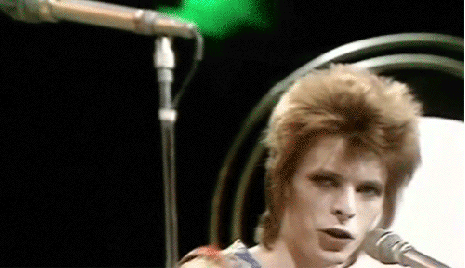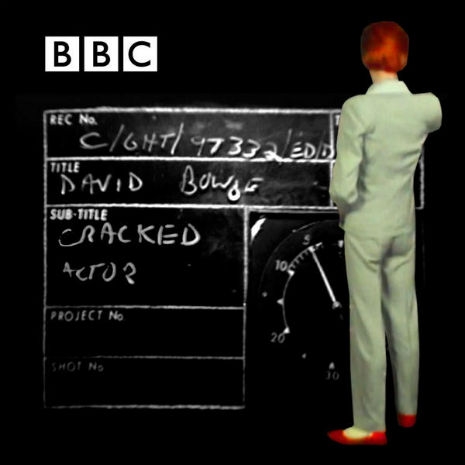
David Bowie playing at Rodney Bingenheimer’s club in Los Angeles, 1970. Courtesy of Getty Images. Buy a print of this photograph at Photos.com.
As—ahem—some of our readers may have noticed over the years, the late David Bowie has always been our patron saint here at Dangerous Minds. You might say he was our spirit animal. Below, three of our writers pay tribute to the Thin White Duke and contemplate a world without David Bowie in it…
***
Christopher Bickel: Let’s be honest. At Dangerous Minds there are certain subjects that we have covered rather extensively. We’ve taken our share of good-natured ribbing over that fact that we jock Bowie hard and often. It goes without saying that the writers here are going to have something to say on this day when we celebrate the career and legacy of one of the true giants of the rock and roll era.
No celebrity death has emotionally affected me to this degree. We haven’t had a musician pass who was so universally loved for their talent and influence since the assassination of John Lennon. Michael Jackson, maybe, but his legacy was so tainted by the time of his death. Bowie’s life and artistic output remained inspiring up until the very end. Last November when the video for “Blackstar” dropped, I remarked that it was a “masterpiece.” Little did I know, then, that it was Bowie’s “parting gift” to us all. Certainly he knew.
I loved Bowie from the first time I heard him—which was “Rebel Rebel” on the radio. But as a kid, I thought the words I was hearing were “Grandma, Grandma—who tore your dress?” I remember at the time thinking “it’s really rude of this singer to call his grandmother a ‘tramp’”—but also kind of cool. I was wrong about the words I was hearing, but I wasn’t wrong about loving the music. The man never put out a bad record. Sure, there’s varying degrees of quality in his catalog, but I challenge anyone to name a single Bowie record that “flat out sucks.” You can’t.
It’s hard to pin down a favorite. I called it as Low for years, but I’ve eventually settled on Scary Monsters as my top pick. New Wave Bowie is my guy. Bowie knew how to pick a backing band, and Fripp just kills it on that record. Reeves Gabrels later picked up that torch and THIS VIDEO from 2006 of “Scary Monsters” is absolutely scorching—and is as good as any Bowie performance from any point in his career. That’s the thing: Bowie remained relevant and exciting as both a writer and performer all the way until the very end. There will never be another.
***

Martin Schneider: What is there to say? One mark of an artist’s power is a general inability on the audience’s part to imagine our world in their absence; we’re all experiencing that weird pang right now, big time. No rock star was more forward-looking or incorporated so many different cultural streams; it shouldn’t be surprising that his influence and resonance have only increased over the years. He was a cultural vampire, in the best sense; he took from everybody and he never aged.
As a teen, I found Bowie incredibly intriguing but also a bit chilly (Pink Floyd was easier); it took me a long time to warm up to him. Of course I did, finally—he’s inescapable, after all. As I get older he strikes me as the very best, the most mature and the most complex, that a rock star can realistically be.
So long, Star Man.
***

Richard Metzger: I first heard of David Bowie when I very first started listening to pop music. My interest in Bowie was probably what got me interested in music to begin with. I was eight and it was early 1974. A local AM radio station played “Space Oddity” at 11pm one night and I happened to be be up late listening and had my young mind totally blown into a million pieces. That song entered my consciousness and exploded there, rearranging my outlook on the world like nothing had before and like nothing has ever since, I can promise you. It was, for me personally, probably the Ur-epiphany of my entire life. But I didn’t catch the name of the singer or the song. The next night, at the exactly same time, the DJ played it again, and then the following night he spun it again. This time I was ready. I taped it with my $30 Sears cassette recorder, the mic held up to the clock radio’s speaker. Soon afterwards I had the 45rpm record and soon after that—a matter of just days—I had the ultra-heavy single only version of “Rebel, Rebel” (a record cut so loud that it threatened to blow out your speakers, as anyone reading this who owned it can attest to). My parents were okay with buying me a 99 cent single from time to time, but an LP (which might’ve cost about $4.98 then) was out of the question and I needed to have everything David Bowie-related. Immediately if not sooner.
So I did yard work and gardening around the neighborhood—weed-pulling to be exact, I was too young for pushing a lawn mower around—to be able to afford first Diamond Dogs, then in fairly rapid succession Aladdin Sane, Pin-Ups, The Man Who Sold the Word, David Live, Young Americans, etc. (Oddly enough, it would be Ziggy Stardust that I acquired last and it remains my least favorite of the pre-ChangesOneBowie catalog.)
And then I saw that they were repeating “The 1980 Floor Show” on The Midnight Special. I don’t think I was ever the same again after I saw that. It was a powerful and visceral lesson in… well… something. I was too young to know exactly what it all meant, but I did know intrinsically what he—David Bowie as an iconic entity—meant. Bowie-fandom was closer to a religion than a hobby. It was a revelation, you might say.
I would scour the TV Guide hoping for a Bowie-sighting and—in lieu of a VCR—I’d tape the audio on my cassette recorder whenever he appeared on things like Soul Train, Dinah!, Cher and the Grammy Awards telecast. I listened to them so many times that 35 years later I would see them again on YouTube and I’d know each and every word. On Dinah! he invited Dr. Thelma Moss on as one of his hand-picked guests, a UCLA professor who was known for investigating the science of Kirlian photography. This was in 1976 and I would have been, at that point ten and in the 5th grade. My Bowie-fanaticism was so ingrained in me by then that I built a rudimentary Kirlian photography device after finding plans for it on microfilm in the local library!

I wrote about this in 2010, on the occasion of the publication of the coffee table book Bowie: Object.
To give you a personal (and very small) example of the multitude of ways David Bowie has influenced little old me, when I was ten years old and Bowie was the guest on Dinah Shore’s afternoon talk/variety show, he was able to invite Dr. Moss on as a guest as well. Moss demonstrated the ability of the Kirlian device—a high voltage electric field “camera”—to basically take snapshots of plant and human “auras.” Because Bowie was fascinated by this wild new science of Kirlian photography, then, hey, so was I and—this is true—I built a homemade version of the Kirlian Photographic device for a grade-school science fair.
It was made with a battery, a wood base, some wire, a metal plate and used 2” by 2” film, which was placed under the plate, and sent a jolt via the battery to expose the film. Now, granted, at that age, I wasn’t testing the “before and after” side-effects of snorting cocaine on my aura (see above) like Bowie was—-I used leaves and my thumbprint—but still, you can see clearly in this stupid example of how I, a little kid at the time, saw David Bowie as this like, larger than life cultural avatar of the newest and coolest things around.
Beyond influencing my 5th grade science fair entry, I’m pretty sure that it was David Bowie that led me directly to my interests in Andy Warhol, Iggy, Lou Reed, the Velvets, George Orwell, and even William Burroughs. My interest in most things artistic and countercultural probably began with David Bowie when I was a kid and simply fanned out from there. I honestly don’t think I would be the same person today, or would have lived the life that I have or that I would even be doing what I do professionally without his influence on not only what I was thinking or feeding my head with when I was very young, but also on the way his life and art demonstrated what was possible to aspire to.
Twelve years ago, when someone working the register at St. Mark’s Books told me that David Bowie had purchased my Disinformation book and DVD—David Bowie knew who I was???—it was one of the proudest moments of my entire life. I simply can’t believe he’s gone.
Below, David Bowie and the Spiders from Mars on the ‘Ziggy’ tour in Dunstable, June 21, 1972 doing “Song for Bob Dylan”: